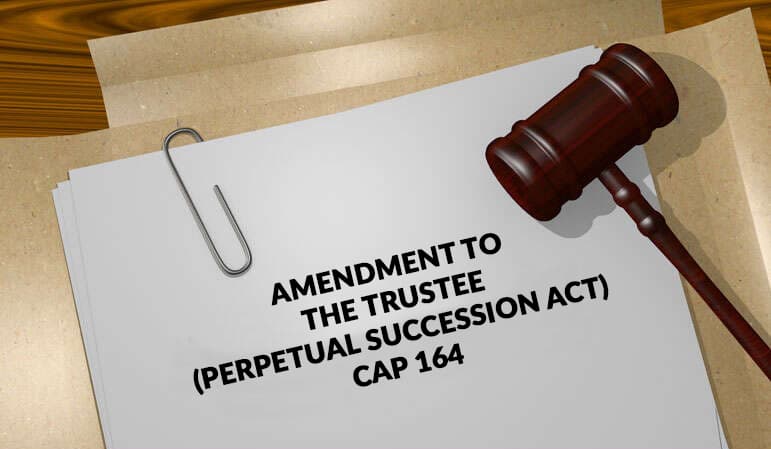UPDATE ON BENEFICIAL OWNERSHIP REQUIREMENTS IN KENYA
Introduction
The Kenya Statute Law (Miscellaneous Amendments) Act, 2019 made amendments to the Companies Act, 2015 by introducing Section 93A which requires every company registered in Kenya to prepare and keep a register of its beneficial owners. Under this Section a copy of such register is to be filed with the Registrar of Companies disclosing personal information of beneficial owners of a company, the nature of ownership or control they have in the company and the date when they became or ceased to become beneficial owners.
The Attorney General published the Companies (Beneficial Ownership Information) Regulations, 2020 (the ‘Principal Regulations’) as the principal regulations which gave effect to the above amendment by stipulating the criteria for a person to qualify as a beneficial owner, the contents of the beneficial ownership register, the filing requirements with the Companies Registrar and the restrictions on disclosure of information contained in the beneficial owners register.
Subsequent to the foregoing, the Attorney General, through Legal Notice No. 32 of 2022, published the Companies (Beneficial Ownership Information) (Amendment) Regulations, 2022 (the ‘New Regulations’) to expand the scope of provisions relating to beneficial ownership as set out below.
Beneficial Ownership Criteria
In the Principal Regulations, beneficial ownership refers to individual persons or companies and beneficial owners include persons who jointly met the following conditions:
- Have power to directly or indirectly appoint or remove a director of the company;
- Indirectly or directly exercise significant influence or control;
- Directly or indirectly hold at least 10% of the issued shares in a company; or
- Directly or indirectly exercise a minimum of 10% of voting rights in a company.
The New Regulations, coupled with the Anti-Money Laundering and Combating of Terrorism Financing Law (Amendment) Bill, 2023, now stipulate a deadline of sixty (60) days from the date of the provision coming into force for all existing registered companies to fully comply with the filing requirements for Beneficial Ownership.
Scope of Disclosure of Beneficial Ownership
The Principal Regulations only permitted disclosures of information contained in a company’s beneficial owners register to a competent authority including the Attorney General, a criminal investigation authority established by law, law enforcement agencies and financial sector regulators. The New Regulations have expanded the scope of disclosure of beneficial information to permit disclosures to:
- A contracting authority with which the company participates in a public private partnership arrangement under the Public Private Partnership Act, 2013 in which the Authority intends to have a function ordinarily undertaken by it performed by a private party. For disclosure to the procuring entity or contracting authority, the competent authority, Public Procurement Regulatory Authority (PPRA) or the Public Private Partnership Committee respectively must seek written consent from the Registrar to request such information from the company prior to requesting for the information.
- A procuring public entity where the company participates in public procurement and assets disposal under the Public Procurement and Asset Disposal Act, 2015 (‘PPADA’).
- Disclosure to the public by the Government where such information affects the country.
Beneficial Ownership Form (BOF 1)
The Beneficial Ownership Form provided for in the Principal Regulations requires the following information on beneficial ownership to be provided:
- Full name of Beneficial Owner
- National Identity Card Number/Passport
- KRA PIN
- Nationality
- Date of Birth
- Residential, Postal and Email Addresses
- Current Telephone Number
- Occupation
- Link of Beneficial Owner with the company
- Nature of ownership or control the beneficial owner has in the company
- Source of Beneficial Ownership Information.
The BOF 1 form has been updated to include information on the connection of a person with indirect ownership has with the company either through appointments of a director or by holding shares on behalf of a beneficial owner. This is provided when listing the nature of ownership or control in the company.
Compliance Requirements
Under the New Regulations, every company is required to undertake the following activities for purposes of compliance:
- Identify its beneficial owners and enter the respective particulars in the company register;
- Lodge a copy of the register of beneficial owners with the Registrar of Companies within 30 days;
- Lodge any changes to the beneficial ownership register with the Registrar of Companies (‘Registrar’) within 14 days;
- Give notice to persons it knows or has reasonable cause to believe is the beneficial owner of the company to provide details of their particulars within 21 days from the date of notice;
- Issue a warning notice to the person who fails to comply with the notice to provide beneficial ownership particulars;
- Restrict the relevant interest of a person who fails to comply with a warning notice within 14 days from the date of notice and file the restriction with the Registrar within 14 days of its issuance.
- Withdraw the restriction placed on the relevant interest of the beneficial owner within 14 days of compliance of the warning notice and file the withdrawal with the Registrar.
Effects and Repercussions of Expansion of Disclosures under the New Regulations
1.Public Tendering Transparency
Companies applying for government and public body contracts will be mandated to disclose beneficial owners’ information during submission of bid applications to ensure tenders are verifiable for compliance.
Once awarded, the PPRA will publicize the beneficial ownership details on relevant sites and portals. This is expected to promote transparency during awarding of tenders to companies in the country.
2. Data Protection Risks
The New Regulations do not clearly state or limit the personal information of the beneficial owner held by the PPRA. As such, some of the information contained in the beneficial owner’s register such as financial investments and residential addresses constitutes sensitive personal information.
Furthermore, the requirement for beneficial ownership contradicts confidentiality provisions under the PPADA which prohibits disclosure of contents of tenders, proposals for quotations during or after the procurement process.
The mandatory publication of beneficial ownership information for successful companies in this case calls for deliberations on the extent of publication of such information.
3. Non-Compliance Risks
Failure by a company registered in Kenya to publish its correct and up to date beneficial owners register attracts a significant fine of up to Ksh.500, 000 on conviction and a continuing fine of Ksh.50, 000 per day for each day of non-compliance which is a prerequisite requirement, puts the company at risk of disqualification from future tender applications.
Recommendations for Compliance
- Affected companies are advised to update their beneficial ownership records and registers of nominees to align with legal requirements.
- Registered businesses are encouraged to review their current ownership and control structures to ensure legal compliance under the definitions of beneficial ownership.
Conclusions
Externally, the New Regulations aim to enhance accountability by companies operating in Kenya while ensuring transparency, combating illicit activities and mandating a culture of legal compliance for corporates.






